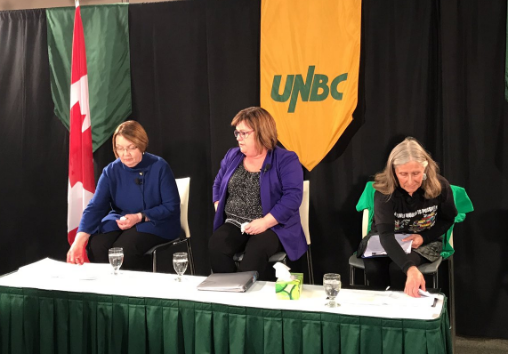The first half of last night’s all candidates debate was nearly the definition of political politeness.
Liberal incumbent Shirley Bond, who has represented the region for 16 years, faced off against NDP hopeful Natalie Fletcher and Nan Kendy for the BC Greens.
Moderator and UNBC political science instructor Dr. Gary Wilson opened the proceedings by inviting Fletcher to introduce herself. Fletcher, fighting a cold, spoke to her experience in the healthcare field, as a sterile processing technician at UHNBC, and as a union rep and President of the North Central Labour Council.
Kendy came next, presenting herself as a long-time resident of northern BC and a third option in the democratic process. Then Bond stepped up, speaking about her family’s connection to Northern BC. She also acknowledged that the economic gains her party has touted so heavily have not been felt as strongly in the north. She promised “four more balanced budgets,” after referencing the Liberal government’s delivery of five consecutive balanced budgets.
The first question went to Fletcher. “What investments would you make to ensure that northern and rural residents have access to comprehensive and timely healthcare services?” She began by stressing the importance of the issue before pointing to her party’s plan to establish urgent care centres across the province.
When Fletcher’s two minutes were up, Bond joined in, calling healthcare a “critical priority everywhere,” before stating that the Liberals have doubled the province’s healthcare budget. “Then why haven’t we seen the benefits?” Fletcher asked. “Well we have the leading health care outcomes in Canada, Natalie,” Bond responded.
Kendy spoke about the Green Party’s “long term and holistic” plan to focus on prevention as a way of relieving stress on the system by reducing the need for acute care. Bond jumped in to say that just because the budget for health care in BC has increased “doesn’t mean there isn’t more work to be done.”
Kendy added that the Green Party will create a Ministry for Mental Health and Addictions, with a focus on detecting mental illness early and increasing the number of safe injection sites in the promise, based on successful European solutions. The party would also spend $35 million over four years on home care, she said.
Kendy got first crack at question two. “How would you encourage closer, constructive relations with FN, particularly in the light of the recommendations of the Truth and Reconciliation Commission?” Reading from her notes, Kendy said her party is committed to making the province’s First Nations full partners in all decisions. Fletcher agreed, specifying that the NDP would work with First Nations on education issues. Bond chimed in, once again in agreement, saying more needs to be done to “close the gap”on issues like education, health care and employment. She pointed to “hundreds” of partnership agreements signed between the provincial government and First Nations as well as the report on child welfare conducted by Grand Chief Ed John. Bond promised that the Liberals intend to pursue all of the report’s recommendations. Kendy got the last word on the issue, saying that the Greens would add mandatory education about aboriginal history and issues to the BC curriculum.
“What is your position on government spending on economic development?” was the third question, posed to Bond. “Our responsibility is to create a climate that supports economic development. We believe in a productive and highly developed private sector.” Kendy was quick to jump in, saying the Liberals have no consideration for the environment or “pollution issues that really need our attention.” She said the Greens will support the development of small scale renewable energy programs, as a way of increasing sustainability and supporting industry while protecting the environment. Bond brought up BC’s carbon tax, which Kendy said has been frozen for far too long. Bond said it will stay that way “until the rest of Canada catches up.” Fletcher didn’t add much on the issue, simply saying, “We have an economy that isn’t working for the working person,”
The Site C project dominated the discussion of question four: “What would you do to help encourage the responsibly development of energy sources in BC?” Fletcher had the first opportunity to answer, stressing the importance of balancing environmental concerns with the need for resource development. “We’re investing in clean energy,” Bond said when Fletcher finished. “It’s not a matter of either or – we’re doing both. Site C will provide cleaner energy for generations to come.” That was Kendy’s cue to cite concerns about the project’s cost and accuse the Liberals of paying for Site C through increased BC Hydro costs. The Greens, on the other hand, plan to spend $120 million on research and development of climate friendly technologies. Bond pivoted to the 2,100 jobs created by Site C, saying 85% of those are held by British Columbians. Kendy shot back, saying jobs are a short term consideration while her party is looking out for the long term success of the province. Fletcher said stopping Site C would not be an easy decision at this stage.
Question 5, about support for small businesses, went to Kendy, who pointed again to the Greens plan to encourage small scale renewable energy projects in local communities. She also cited plans to increase access to broadband internet across the province and the jobs that would be created by building that infrastructure. Bond boosted small business as the heart of the province, with 98% of BC businesses considered small. The Liberals plan to eliminate PST on electricity for small businesses, reduce red tape and ensure appropriate training exists to support small businesses, she said. Fletcher agreed, saying the NDP plans a similar approach, but noted that the type of support needed depends on the business. Kendy had final say once again, saying the Green Party would “establish an emerging economy task force” with a focus on technology and innovation.
The final question was about education. “What steps would you take to ensure that northern BC has the training and education to prosper in the next decades?” Investing in post-secondary training opportunities is critical, Bond began, pointing to expanded programs in health care and engineering at CNC, UNBC and other institutions in the north. Fletcher immediately jumped on the Liberal government’s prolonged court battle with BC teachers and the fact that the Prince George school district has had more school closures than any other district in the province. The Green Party will invest $500 million into early education, which would also serve as part of their child care plan, Kendy said. Bond wanted to know how the Greens plan to raise that money, saying the Liberals have increased the provincial education budget every year they’ve been in office. She did acknowledge the high number of school closures, saying they have been tough decisions and mostly due to declining enrolment.
That was the end of the first section of the debate. The crowd gave each candidate a solid round of applause following their closing remarks. Speaking to audience members afterwards, the consensus seemed to be that Prince George-Valemount will be Bond’s to lose.
Something going on in the Prince George area you think people should know about?
Send us a news tip by emailing [email protected].







